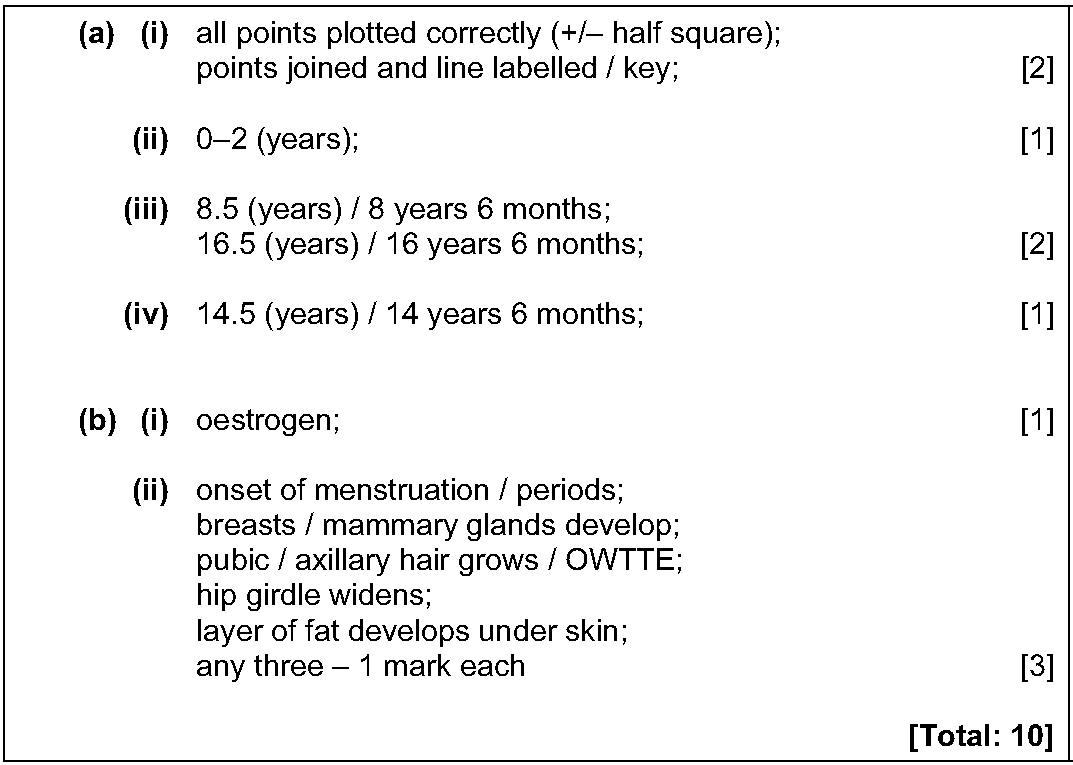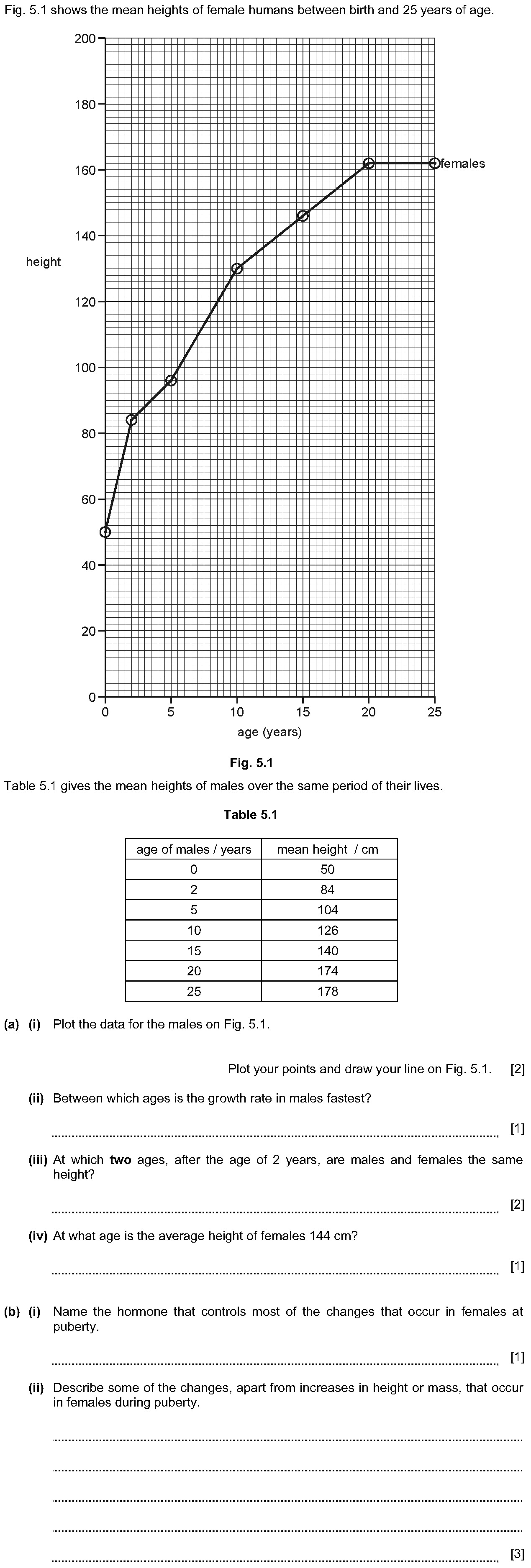
Q5:
Cambridge IGCSE Biology - 0610 - Core Paper 3 2010 Winter Zone 3
Questions:
5/9

Topic: CH16 - REPRODUCTION
Solution



PRACTISE
Similar Questions

LEARN
Concepts with Sparky

More Questions from this Topic
Theory
CH16 - REPRODUCTION
(a) (i) Plot the data for the males on Fig. 5.1. Plot your points and draw your line on Fig. 5.1. [2](ii) Between which ages is the growth rate in mal...
2010
 Winter
Winter
 Winter
Winter
 3
3
Theory
CH16 - REPRODUCTION
(a) Sexual reproduction in flowering plants involves both pollination and fertilisation.(i) Explain the difference between pollination and fertilisati...
2009
 Summer
Summer
 Summer
Summer
 6
6
Theory
CH16 - REPRODUCTION
(a) (i) State one function of each of the parts labelled M and N.M.......................................................................................
2012
 Summer
Summer
 Summer
Summer
 2
2
Theory
CH16 - REPRODUCTION
(a) State the main features of asexual reproduction.1 ...................................................................................................
2012
 Summer
Summer
 Summer
Summer
 3
3
Theory
CH16 - REPRODUCTION
Fig. 8.1 shows the male reproductive system.(a) Using a label line and the letters given, label on Fig. 8.1,(i) G where gametes are formed, [1](ii) S ...
2009
 Summer
Summer
 Summer
Summer
 3
3
Theory
CH16 - REPRODUCTION
Fig. 4.1 shows a section along a pea pod, the fruit of a pea plant.(a) (i) Name the parts of the original pea flower from which structures A and B hav...
2012
 Winter
Winter
 Winter
Winter
 3
3
Theory
CH16 - REPRODUCTION
(a) Fig. 6.1 shows the female reproductive system. Describe the functions of each of the following structures in the female reproductive system.(i) ov...
2009
 Winter
Winter
 Winter
Winter
 2
2
Theory
CH16 - REPRODUCTION
(a) (i) Name the structures labelled A and B. A..........................................................................................................
2012
 Summer
Summer
 Summer
Summer
 2
2
Theory
CH16 - REPRODUCTION
Fig. 7.1 shows a bee visiting a flower.(a) (i) State one advantage to the bee of its visit to this flower................................................
2012
 Summer
Summer
 Summer
Summer
 3
3
Theory
CH16 - REPRODUCTION
(a) (i) Name the tubes labelled M, N and O.M ............................................................................................................
2011
 Summer
Summer
 Summer
Summer
 7
7
More Questions from year 2010
MCQ
CH1 - CHARACTERISTICS AND CLASSIFICATION OF LIVING ORGANISMS
What is defined as the chemical reactions that break down food molecules in cells to release energy?
2010
 Summer
Summer
 Summer
Summer
 2
2
MCQ
CH1 - CHARACTERISTICS AND CLASSIFICATION OF LIVING ORGANISMS
The diagram shows an arthropod animal. Which features are characteristic of all arthropods?
2010
 Summer
Summer
 Summer
Summer
 3
3
MCQ
CH1 - CHARACTERISTICS AND CLASSIFICATION OF LIVING ORGANISMS
The diagram shows a section through a flower. Using the key, identify this flower.1. sepals present ........................................... go to ...
2010
 Summer
Summer
 Summer
Summer
 3
3
MCQ
CH2 - ORGANIZATION AND MAINTENANCE OF THE ORGANISM
Which row shows the most likely number of chloroplasts in three types of cell in a leaf? [Table_1]
2010
 Summer
Summer
 Summer
Summer
 1
1
MCQ
CH2 - ORGANIZATION AND MAINTENANCE OF THE ORGANISM
The diagram shows some liver cells as they appear under the microscope. How many cell walls can be seen?
2010
 Summer
Summer
 Summer
Summer
 3
3
MCQ
CH2 - ORGANIZATION AND MAINTENANCE OF THE ORGANISM
Which row shows the structures present in plant and animal cells? [Table_1]
2010
 Summer
Summer
 Summer
Summer
 2
2
MCQ
CH2 - ORGANIZATION AND MAINTENANCE OF THE ORGANISM
Which structure is at a different level of organisation from the other three?
2010
 Summer
Summer
 Summer
Summer
 1
1
MCQ
CH2 - ORGANIZATION AND MAINTENANCE OF THE ORGANISM
Which diagram shows one organ only?
2010
 Summer
Summer
 Summer
Summer
 2
2
MCQ
CH3 - MOVEMENT IN AND OUT OF CELLS
On a dry, sunny day, how does water vapour move through the stomata of a leaf?
2010
 Summer
Summer
 Summer
Summer
 2
2
MCQ
CH3 - MOVEMENT IN AND OUT OF CELLS
The diagram shows an experiment using a potato.Which shows the result of the experiment after 24 hours?
2010
 Summer
Summer
 Summer
Summer
 2
2




 Share
Share




 Previous
Previous




